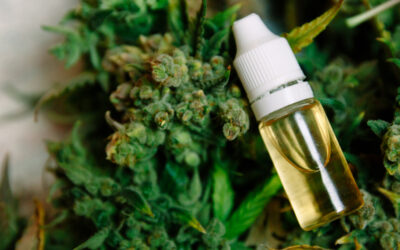AXIM Biotechnologies announced that they are conducting proof of concept clinical trials for their CBG-based ointment for the treatment of psoriasis and eczema.
AXIM Biotechnologies, a significant investment company for Medical Marijuana, Inc., has begun the first ever human clinical trials into the the dermatological use of cannabinoids for psoriasis and atopic dermatitis, commonly referred to as eczema. AXIM Biotechnologies is testing their proprietary AX-1602, a patent-pending topical ointment formulated with cannabigerol (CBG) and other cannabinoids. AXIM’s CBG ointment will be tested in a placebo controlled study to best judge its efficacy before moving into phase I trials.
AXIM Biotechnologies is active in the use of cannabinoids to create pharmaceuticals and treatments for conditions with no known current effective treatments, like Parkinson’s disease, Alzheimer’s disease, ADHD, PTSD, autism, multiple sclerosis spasticity and pain, restless leg syndrome, glaucoma, IBD and IBS, and Crohn’s disease.
Dr. Titus, CEO of Medical Marijuana, Inc., remarked, “It is exciting for us to see that our portfolio company in pharmaceutical development is entering into early stage clinical trials on their new topical formulation, which will potentially assist psoriasis and atopic dermatitis patients.”
AXIM’s announcement of these clinical trials was also featured by Forbes.
CBG has been a long overlooked and understudied compound of the cannabis plant. CBG is not considered psychoactive and is not specifically scheduled in either international or U.S. regulations restricting cannabis, making it a strong alternative to traditional treatments without the side effects of THC-based medications.
Although many people are aware of tetrahydrocannabinol (THC) and cannabidiol (CBD), CBG has remained mostly unknown, even in the medical community. “It has not been as well studied, but its a very interesting molecule,” said AXIM’s chief executive officer Dr. George Anastassov.
CBG is found in greater concentrations in hemp than marijuana. This may be in part due to a recessive gene in the cannabis plant that manifests more often in certain hemp cultivars than in high-THC marijuana. Often called the “stem cell” cannabinoid, cannabigerolic acid (CBGa) can be transformed by the cannabis plant into THCa, CBDa, and CBCa and is therefore the direct precursor of THC, CBD, and CBC. CBG, the compound in AXIM’s clinical trial, is made by decarboxylating CBGa.
“CBG is one of the emerging cannabinoids that holds significant therapeutic promise. The topical application provides a great start toward research into this potentially therapeutic cannabinoid,” stated Dr. Titus in discussing AXIM’s clinical trial.
Studies suggest that CBG has anti-inflammatory properties, which is one of the reasons AXIM Biotechnologies chose it for the focus of this study. However, CBG has also shown promise in previous research into its anti-nausea effects, its neurogenic properties (stimulates the growth of brain cells), and its ability to slow the growth of cancer cells. CBG also inhibits the uptake of GABA, a chemical in the brain that controls the firing of neurons. This is effective for decreased anxiety and muscle tension. There may even be a link between CBG and seizures, once thought to be the exclusive realm of CBD.
Previous research suggests that cannabinoids are effective in the treatment of psoriasis by blocking keratinocyte proliferation, setting the stage for AXIM’s clinical trial.
Both psoriasis and eczema represent large markets calling for a safe and reliable treatment. The worldwide prevalence of psoriasis is around 2%, but in developed countries, that number jumps to 11.4%. The psoriasis market is expected to grow to $10.4 billion by 2020. Likewise, the eczema market should be worth $5.6 billion by 2022 with a worldwide prevalence of up to 5%. In developed nations, the number jumps to nearly 17%. There has been an established upward trend in these diseases, and once approved, AXIM’s CBG-based medication will tackle a combined market worth an estimated $16 billion by 2022.
There are a number of treatments currently available for psoriasis, including topical treatments, systemic or biologic treatments, or phytotherapy, among others. However, these treatments present a number of problems, including low efficacy, inconvenience, and organ toxicity.
Eczema treatments also use topicals, systemic medications, and light therapy. Again, there are limits to these therapies, including thinning of the skin, irritation of the skin, and a raised risk of skin cancer, liver damage, and severe infection.
The system for gaining approval and conducting clinical trials is favorable in The Netherlands, where AXIM will conduct their trials. The progressive nation was one of the first EU countries to implement the EU’s Clinical Trials Directive, and streamlined regulatory systems in The Netherlands allow trials to move forward in as little as two weeks after seeking approval.
The availability of high quality medicinal grade cannabis in The Netherlands has also been crucial to cannabis research. Cannabis used for research is provided by the Office of Medicinal Cannabis. The acceptance of cannabis and cannabinoid-based medicines in The Netherlands has led to a boom in cannabinoid research.
AXIM Biotechnologies will be performing their clinical trials at The Maurits Clinic in The Hague, The Netherlands. Dr. Marcus Meinardi, who will be heading the trials, has worked at the clinic as a dermatologist since 2005. AXIM Biotechnologies chose CBG in this proof of concept study for the treatment of psoriasis and eczema specifically for its anti-inflammatory properties.
The clinical trial will break participants into 3 groups. The first group will be given a placebo. The second group will use the company’s CBG ointment. The third group will receive a combination treatment of the CBG ointment and AXIM’s patented CBG gum. It will take six weeks to complete the clinical trial. Once the successful trial is completed, AXIM’s products will be registered as a topical treatment for the trial approved skin disorders.
“Depending on the results of the trial, we could go two ways,” said Dr. Anastassov. “We could go forward with an over-the-counter cosmetic product in about 6-12 months or we could file for an NDA (new drug application.) The NDA would go through the FDA (U.S. Food and Drug Administration) and that would take about 3 years.”
In addition to the AX-1602 ointment currently in clinical trials, AXIM Biotechnologies is also developing a patented cannabinoid infused gum, a CBG-based line of skincare products, a CBD-based oral care line, a cannabinoid suppository for gastrointestinal diseases, and a cannabinoid-based treatment for conjunctivitis.
To learn more about AXIM Biotechnologies, visit their company page, or stop by our education page for overviews of the research into cannabinoids for the treatment of psoriasis and eczema.






